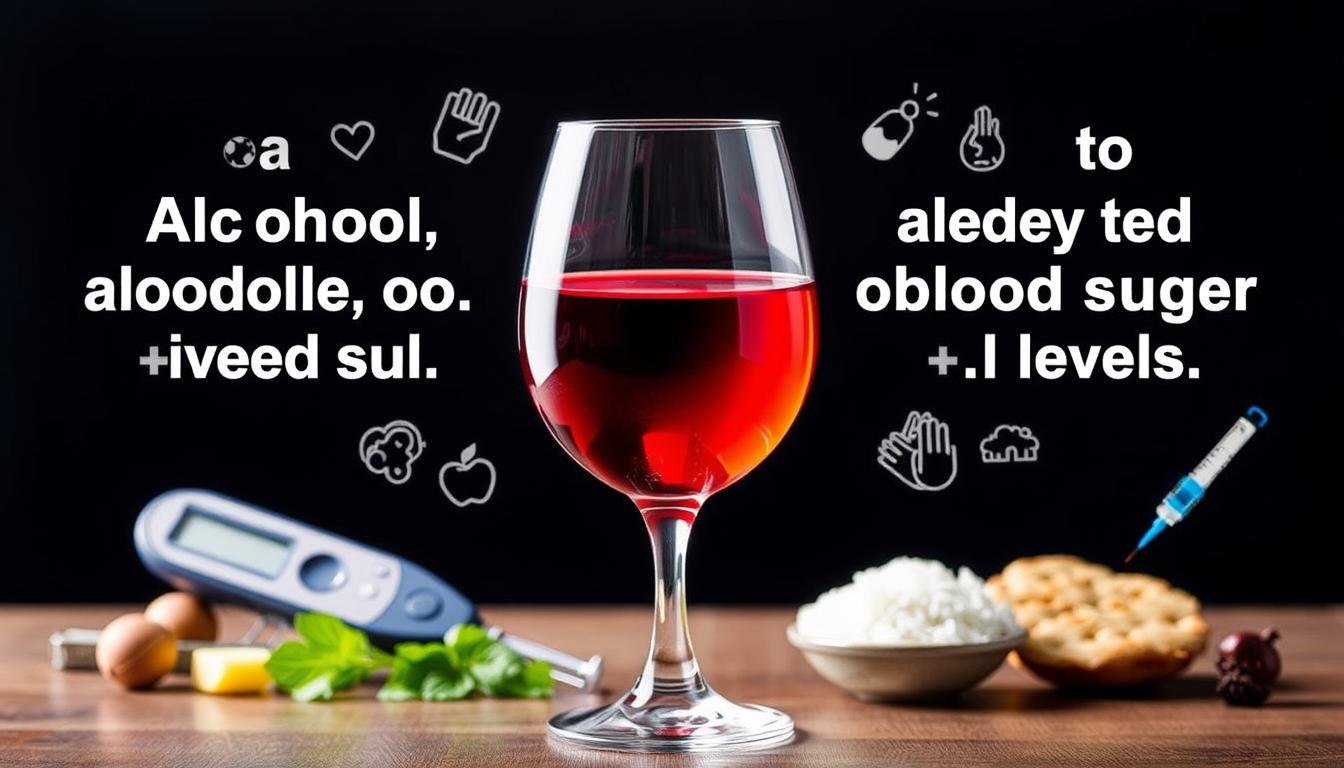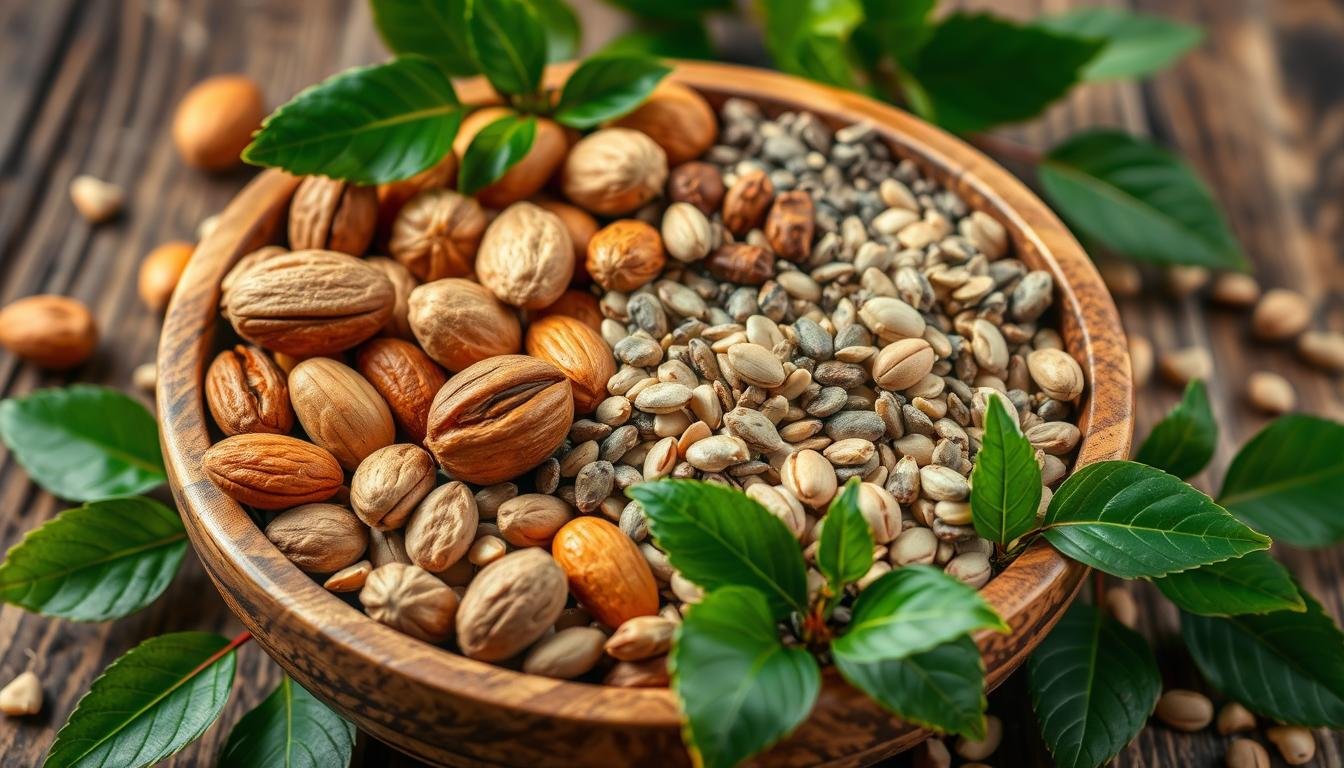Did you know alcohol can impact your blood sugar for up to 12 hours after drinking? This fact is crucial for those managing diabetes. It highlights how essential it is to understand the effects of alcohol on blood sugar and insulin. These effects can cause big shifts in blood glucose levels, bringing about health risks.
Talking with your healthcare team about alcohol and diabetes is very important. The American Diabetes Association suggests asking three key questions before drinking: Is my diabetes under control? Has my healthcare team okayed alcohol for me? Do I know how alcohol changes my blood sugar levels? These questions help create a safe plan for drinking while living with diabetes.
Next, we’ll look into how alcohol affects blood sugar, the danger of low blood sugar, and how alcohol interacts with diabetes medicines. It’s important for managing diabetes while still enjoying time with friends responsibly.
Key Takeaways
- Alcohol can affect blood sugar for up to 12 hours.
- Moderate drinking recommendations are up to 1 drink for women and 2 for men.
- Light beers and dry wines are better choices for people with diabetes.
- Low blood sugar risks are heightened if alcohol is consumed without food.
- Regular monitoring of blood glucose levels is crucial when drinking alcohol.
Understanding Diabetes and Blood Sugar Levels
Diabetes is a serious condition that affects blood glucose levels. It appears mainly as Type 1 and Type 2 diabetes. In Type 1 diabetes, the body fails to make insulin. Type 2 diabetes means the body resists insulin. These conditions complicate diabetes management. It’s important to know how they work and their symptoms.
Managing diabetes well means keeping track of blood sugar levels. Diet and lifestyle choices play a big role in these readings.
Basic Diabetes Overview
People with diabetes struggle to keep their blood sugar stable. This is due to insulin problems. Common symptoms include thirst, more frequent urination, and feeling tired. Knowing about diabetes types and how insulin works is key to understanding this disease.
- Type 1 Diabetes: Mainly found in kids and young adults, it requires insulin daily.
- Type 2 Diabetes: Can be related to lifestyle choices. It might be managed with diet and exercise, but some need insulin or other medicines.
- Symptoms: Signs to watch for include constant hunger, going to the bathroom a lot, and blurry vision.
Good diabetes care means checking blood sugar levels often. This includes planning meals and times for taking insulin. It’s crucial to know how certain foods, especially those with a lot of sugar, can affect blood sugar.
Keeping fasting blood sugar between 70-100 mg/dl is key. Sticking to a routine that includes monitoring blood sugar, regular exercise, and consulting healthcare providers helps maintain good blood sugar levels. Activities like walking or swimming for 150 minutes a week are beneficial.
| Type of Diabetes | Insulin Dependency | Common Age of Onset | Management Approach |
|---|---|---|---|
| Type 1 Diabetes | Yes | Childhood/Young Adult | Insulin therapy required |
| Type 2 Diabetes | Sometimes | Adults | Diet, exercise, medication |
What Happens to Blood Sugar When Consuming Alcohol
It’s important to understand how drinking alcohol affects blood sugar, especially for those with diabetes. When you drink, your liver focuses on breaking down the alcohol. This means it can’t do its usual job of releasing glucose into the blood. As a result, your blood sugar levels can go up or down unexpectedly.
If you drink alcohol without eating, your blood sugar can fall under 70 mg/dL. Your liver needs 1 to 1.5 hours to process each drink. So, drinking on an empty stomach can lead to low blood sugar levels later on.
Drinking a lot daily, like five drinks for men and four for women, can up your diabetes risk. Too much alcohol can mess with your blood glucose and raise your blood pressure and triglycerides. This makes managing diabetes harder.
For those with diabetes, some drinks are better than others. If you want to drink, consider choosing:
- Red wine
- Dry white wine
- Distilled spirits like gin or vodka
- Light beer
- Hard seltzer
- Low-carb cocktails
Remember, alcohol can hide the signs of low blood sugar, which is tricky for managing your health. It also can mess with diabetes medicines and insulin. This makes controlling your blood sugar harder.
Too much drinking can also lead to weight gain. It does this by making you hungrier and increasing the calories you take in. Knowing how much and what types of alcohol to drink is key for keeping your blood glucose levels in check.
| Type of Beverage | Carbohydrates per Serving |
|---|---|
| Lite Beer | 5 grams |
| Dark Beer | Up to 25 grams |
| White Wine | 3-4 grams |
| Semi-Sweet/Dessert Wine | 12-20 grams |
| Liqueurs (e.g., Amaretto) | 17 grams per ounce |
| Spirits (e.g., Vodka) | 0 grams |
Alcohol and Diabetes: How It Affects Blood Sugar and Insulin
Drinking alcohol adds a twist to managing diabetes. It’s key to know its effects on blood sugar and insulin. Moderate drinking might help improve insulin sensitivity. However, too much alcohol often causes insulin resistance. This makes controlling blood sugar harder.
Alcohol makes the liver focus on breaking it down, not on controlling blood sugar. This can cause sudden high blood sugar in some diabetics. Others might face very low blood sugar, or hypoglycemia, if they haven’t eaten well.
Moderation is essential when it comes to alcohol, blood sugar, and avoiding insulin resistance. For those with diabetes, it’s usually advised to limit to one drink a day for women and two for men. Testing blood sugar before drinking and having snacks ready is crucial to handle sugar changes.
Here’s a brief look at how drinking levels affect diabetes management:
| Alcohol Consumption Level | Effect on Blood Sugar | Insulin Sensitivity Impact |
|---|---|---|
| Moderate Consumption | Potential rise in blood glucose depending on drink type and meal | May improve insulin sensitivity |
| Excessive Consumption | Possible spikes in blood sugar levels | Increases insulin resistance |
| Inadequate Nourishment | Risk of severe hypoglycemia | N/A |
Knowing how alcohol affects diabetes is crucial for good health. Managing how much you drink is key to maintaining stable blood sugar and insulin levels. This has a big impact on overall well-being.
The Risks of Low Blood Sugar (Hypoglycemia) When Drinking
For people with diabetes, drinking alcohol brings big risks. It mainly worries about hypoglycemia. When you drink, your liver works on breaking down the alcohol first. This can stop it from making glucose. That can lead to low blood sugar during and after drinking. The more you drink, the higher the risk of low blood sugar becomes.
Low blood sugar symptoms can look a lot like being drunk. This makes it hard to tell when you’re hypoglycemic, which can be unsafe. You might feel dizzy, shake, or get tired. These signs are important to watch for. Keeping an eye on your blood sugar while drinking is key.
There are guidelines on how much alcohol is okay. Women with diabetes should have no more than one drink a day. Men should stick to two drinks a day at most. Staying within these limits can help avoid blood sugar issues. Also, never drink on an empty stomach. Eating can help keep your blood sugar steady.
The kind of drink also matters. Beers and sweet drinks are high in carbs, which might spike your blood sugar. It’s important to know how different drinks can affect you. Managing your diabetes well means understanding these details.
Always check your blood sugar before, during, and after having alcohol. Make sure your blood sugar is at a safe level before going to bed. This helps avoid problems. Some people, especially those with diabetes complications, might need to skip alcohol altogether. A doctor can offer the best advice here.
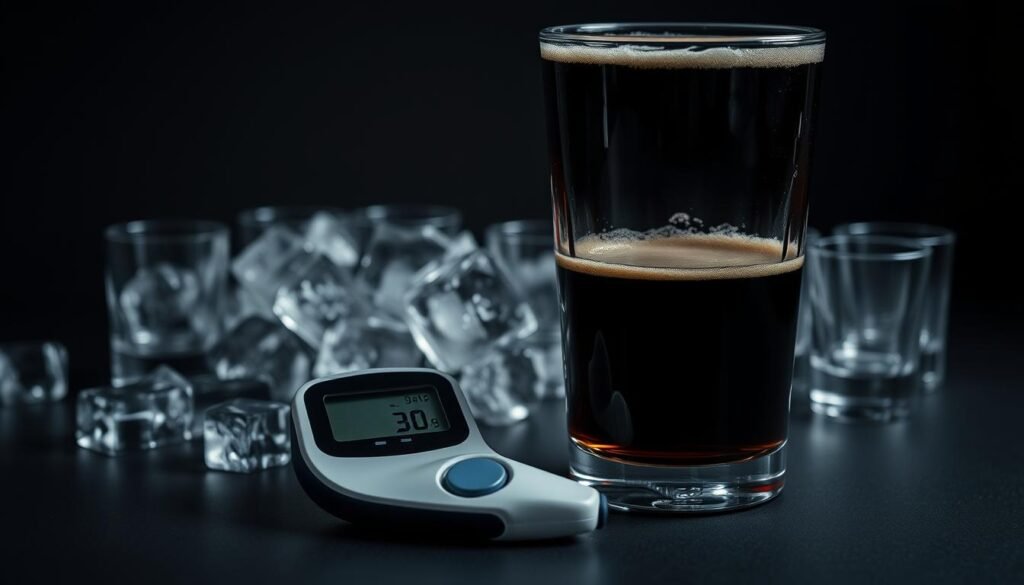
Being aware of hypoglycemia risks with alcohol is crucial for those with diabetes. Good planning and moderation make it safer to enjoy drinks socially. Being informed helps reduce risks and makes social events more enjoyable.
The Impact of Alcohol on Diabetes Management
Understanding how alcohol and diabetes management connect is crucial. Moderate drinking might slightly improve A1C levels for some, but its effects can vary. Drinking too much can make controlling blood sugar hard, mainly due to added calories causing weight gain.
For those managing diabetes, knowing alcohol’s role is key. Too much drink can lead to sugar level spikes and drops. This is risky, especially for those on insulin or certain meds. Symptoms like dizziness and trouble focusing can impact daily life. Treating low blood sugar quickly is important to avoid serious outcomes.
Following UK guidelines—no more than 14 units of alcohol weekly—is a good habit. Spreading out drinking over several days helps maintain steady sugar levels. Those of South Asian, African-Caribbean, or Black African backgrounds should be extra careful due to a higher diabetes risk.
A deep understanding of alcohol’s effect on sugar levels is key to managing diabetes. Talking about drinking habits with a doctor is a good idea. It ensures lifestyle choices support health. For more on diabetes types and signs, see this resource.
| Alcohol Consumption | Impact on Blood Sugar | Recommended Limit | Symptoms of Hypoglycemia |
|---|---|---|---|
| Regular Drinking | Increases risk of type 2 diabetes and hypoglycemia | No more than 14 units per week | Dizziness, sweating, mood changes |
| Excessive Drinking | Disrupts blood sugar stability, increases weight | Spread over 3+ days for lower health risks | Trembling, difficulty concentrating, hunger |
How Alcohol Interacts with Diabetes Medications
It’s key to know how alcohol and diabetes meds mix if you’re managing diabetes. Alcohol might make these meds, like insulin, less effective. This can mess with blood sugar control, leading to health issues.
For those on insulin or diabetes meds, drinking can up the risk of hypoglycemia. This low blood sugar risk is serious. To avoid trouble, check blood sugar before sleep if you’ve had drinks. Eating a snack can help stop blood sugar drops at night.
Diabetes experts suggest limiting drinks to two or less per week. A “standard” drink is:
- 341 mL (12 fl oz) of 5% beer
- 142 mL (5 fl oz) of 12% wine
- Mixed drink with 43 mL (1.5 fl oz) of 40% hard liquor
Never drink alcohol on an empty stomach, as it can cause hypoglycemia. Also, if you can’t tell when your blood sugar is low, stay away from alcohol.
It’s a bad idea to drink after exercising, as it can lower blood sugar further. If you have nerve damage or high blood pressure, avoid alcohol due to extra risks.
Be extra careful with alcohol, especially if driving. Alcohol hits harder when your blood sugar is low, raising the danger. Always talk to your healthcare provider about safe drinking if you have diabetes. This helps you stay safe while socializing.
Type 1 Diabetes and Alcohol Consumption
People with type 1 diabetes have to be careful with alcohol. Drinking can make blood sugar levels swing up and down. This can make managing diabetes harder. It’s key to know how alcohol can change glucose metabolism.
It’s crucial to watch your blood sugar and plan well if you drink. Here’s what you should do:
- Monitor Blood Sugar: Check your glucose before and after drinking. This helps you understand how alcohol affects you.
- Eat Before Drinking: Eating before you drink can lower the chance of low blood sugar, which people with type 1 diabetes often face.
- Know Your Drinks: Knowing how many carbs are in your drinks helps you control your blood sugar better.
- Stay Hydrated: Drinking water between alcoholic beverages can stop dehydration. It also helps with blood sugar management.
Doctors suggest that people with type 1 diabetes should limit their drinking. This helps avoid sudden problems and keeps blood sugar steady. Following the advice of no more than two drinks a day is wise. Remember, each drink has about 10 grams of alcohol. Moderation is essential to dodge problems like low blood sugar and diabetic ketoacidosis.
Long-term effects of drinking include higher triglyceride levels and weight gain from the extra calories in drinks. It’s also important to teach friends and family about how alcohol impacts diabetes. This knowledge can make social events safer.
By drinking carefully and staying alert, those with type 1 diabetes can have fun without risking their health. For in-depth info, look at this valuable resource.
Type 2 Diabetes: Understanding the Effects of Alcohol
Alcohol can impact people with type 2 diabetes in different ways. It’s important to know these effects for maintaining weight and health. Some studies show light to moderate drinking might be okay, maybe even helpful.
The ACCORD trial with 10,200 participants found light drinkers didn’t see higher blood pressure. But, those who drank more faced elevated blood pressure and hypertension risks. This finding highlights the dangers of drinking too much.
Light-to-moderate drinkers often had better health markers than those who didn’t drink or drank heavily. Yet, drinking a lot can increase glucose levels, harming glucose control. So, drinking in moderation is key for diabetes management.
The American Diabetes Association advises men to have up to two drinks a day. Women should limit to one drink. Sticking to these limits can reduce risks like increased blood pressure and insulin resistance.
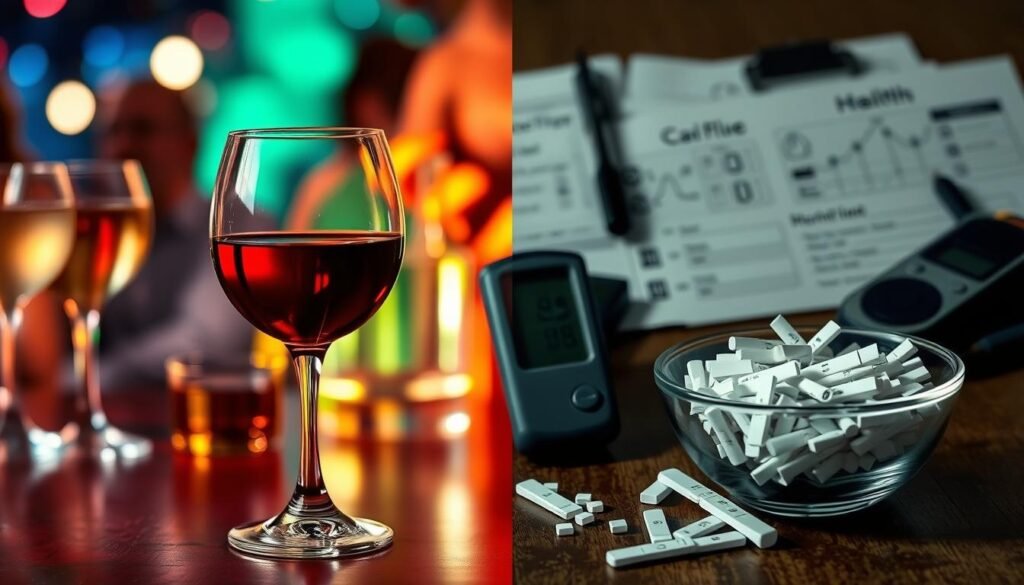
Not managing insulin well can cause weight gain and make managing diabetes harder. Too much alcohol can also cause fatty liver disease and increase nerve damage risks, known as diabetic neuropathy.
Staying within recommended drinking limits helps keep blood sugar and weight in check. Opting for lower-carb drinks and drinking water between alcoholic ones are smart moves. These habits can lead to better health for those with type 2 diabetes.
Identifying Symptoms of High Blood Sugar (Hyperglycemia)
Knowing hyperglycemia symptoms is key for those with diabetes, especially after drinking alcohol. Alcohol can cause blood sugar to rise, more so if you drink carb-heavy beverages. Learning these signs helps you act quickly to prevent problems.
Common symptoms of high blood sugar include:
- Increased thirst
- Frequent urination
- Blurred vision
- Nausea
- Fruity breath odor
- Stomach pain
Alcohol affects blood sugar for up to 24 hours after you drink. Women should have no more than one drink a day, and men should limit themselves to two. Sweet wines and cocktails with lots of carbs can make your blood sugar swing widely.
People with diabetes need to listen to their bodies. High blood sugar symptoms can look like low blood sugar signs. Blood sugar over 600 mg/dL can lead to severe problems, like diabetic hyperosmolar syndrome. Tools like continuous glucose monitors can help by watching your sugar levels and warning you when they’re too high.
Wearing medical ID is vital for those with diabetes, to get quick help in emergencies. For tips on diabetes management and understanding blood sugar, visit this link.
| Symptoms of Hyperglycemia | Symptoms of Hypoglycemia |
|---|---|
| Increased thirst | Shakiness |
| Blurred vision | Sweating |
| Nausea | Dizziness |
| Fruity breath odor | Headache |
| Stomach pain | Confusion |
Weight Management and Alcohol: Considering Diabetes Complications
It’s very important for those with diabetes to manage their weight well. Obesity can greatly increase the risk of complications from diabetes. Alcohol plays a big role in this, affecting both weight and health.
People with diabetes usually drink less than those without it. This is likely because doctors warn them about alcohol’s effects on blood sugar and weight. Since alcohol has about 7 calories per gram, it can add a lot of calories and lead to weight gain if you drink too much.
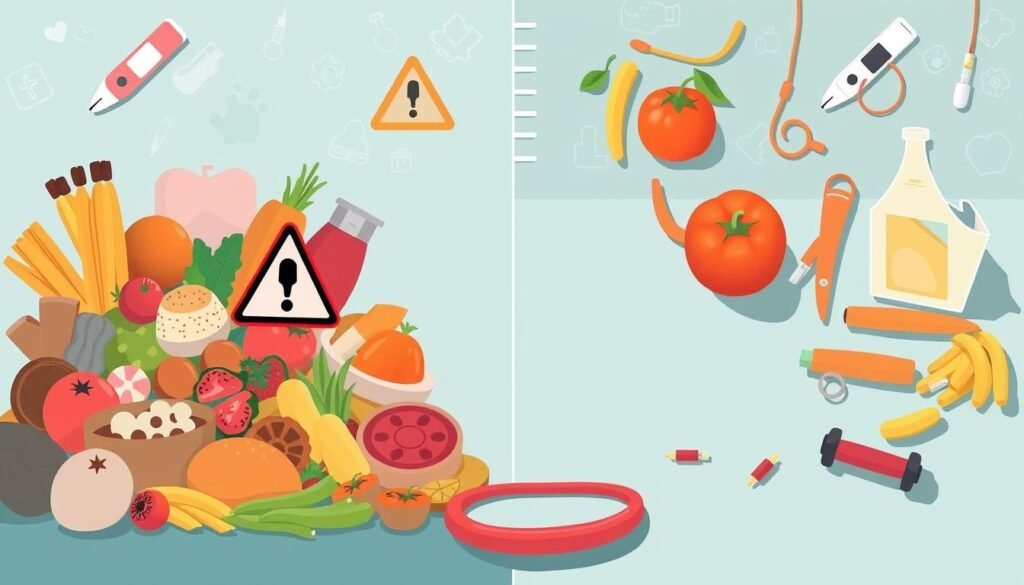
Drinking a moderate amount of alcohol can actually help with blood sugar control and insulin sensitivity. For women, this means one drink a day. For men, it’s up to two drinks. However, drinking a lot—more than three drinks daily—can increase blood sugar and A1C levels. Also, drinking too much over a long time can harm glucose tolerance, affecting both weight and diabetes risk.
How alcohol affects you can vary. It’s important to get advice from a doctor about drinking if you have diabetes. Here are some things to think about:
- Alcohol doesn’t need insulin to be used by your body, so some drinks like spirits have no carbs.
- But sweet wines and cocktails can have a lot of carbohydrates.
- The sugar in alcoholic drinks gets into your blood fast. This doesn’t help much if your blood sugar drops too low.
- If you drink on an empty stomach, your blood sugar can drop quickly. This makes managing diabetes harder.
In summary, drinking alcohol moderately can have some benefits. But, drinking too much can make managing weight and diabetes harder. It’s crucial to follow guidelines and talk with a healthcare professional if you have diabetes and want to drink.
| Alcohol Type | Calories per Serving | Carbohydrates (grams) |
|---|---|---|
| Beer (12 oz) | 150 | 12 |
| Red Wine (5 oz) | 125 | 4 |
| White Wine (5 oz) | 120 | 3 |
| Spirits (1.5 oz) | 97 | 0 |
| Pina Colada (6 oz) | 500 | 32 |
Safe Drinking Guidelines for People with Diabetes
Knowing the safe drinking guidelines is vital for anyone with diabetes. Alcohol affects blood sugar levels, so be careful and moderate. The American Diabetes Association says women should only drink one drink a day and men two. Here are the standard drink sizes:
| Type of Alcohol | Standard Serving Size |
|---|---|
| Beer | 12 ounces |
| Wine | 5 ounces |
| Hard Liquor (80-proof) | 1.5 ounces |
When drinking alcohol, being careful about what you eat with it is key. Drinking on an empty stomach or after working out can cause low blood sugar, especially if you’re on insulin or medications to lower blood sugar. Eating something when you drink can help keep your blood sugar stable.
Be careful with sugary mixers in cocktails and mixed drinks too. They’re high in carbs and can raise your blood sugar. Choosing diet, light, or zero options can reduce this risk. Always talk to your healthcare team for advice on how to drink safely with diabetes.
People with diabetes can still enjoy drinks if they’re smart about it. By paying attention to how much and what you eat, you can drink responsibly. Following the safe drinking guidelines helps you make choices that are good for your health and enjoyable at social events.
Conclusion
Alcohol and diabetes have a complex link. It’s important for people watching their blood sugar. Knowing how alcohol influences blood sugar and insulin is key for diabetes care. It’s vital to have a personalized approach to drinking. This should consider your diet, how much you drink, and how often.
Research shows alcohol can drop blood sugar in the short term. Yet, drinking a lot over time can up the risk of insulin resistance and higher blood sugar. Keeping an eye on this is crucial. Alcohol stops the liver from making glucose. Always talk to healthcare providers for advice that fits your life and health goals.
People with diabetes or those at risk should be careful with alcohol. Being mindful helps you control your blood sugar and stay healthy. To learn more about how alcohol affects blood sugar control, click here.
